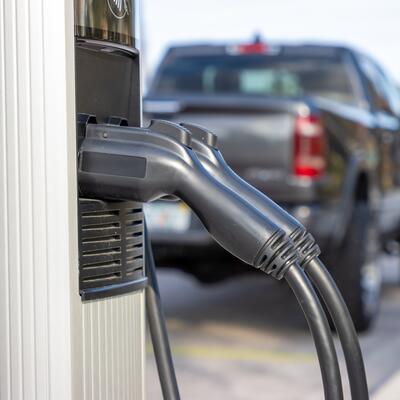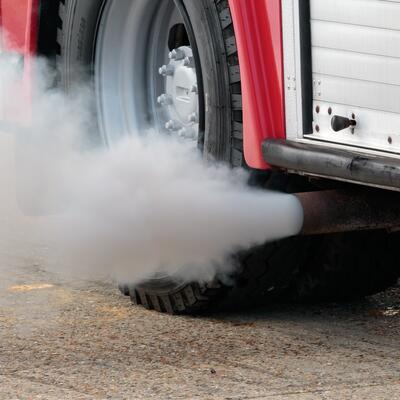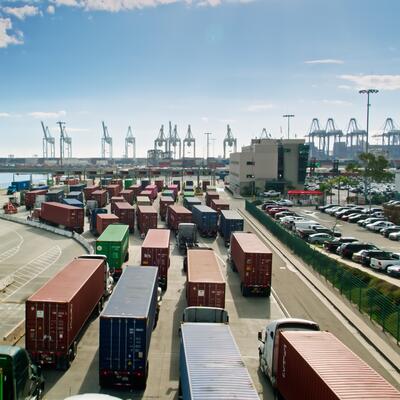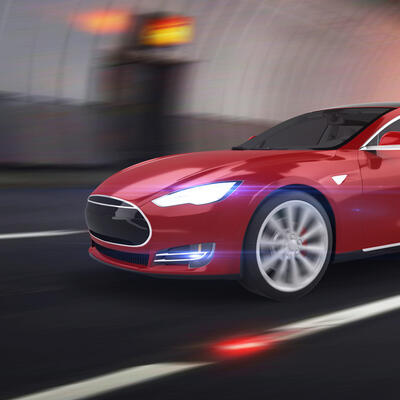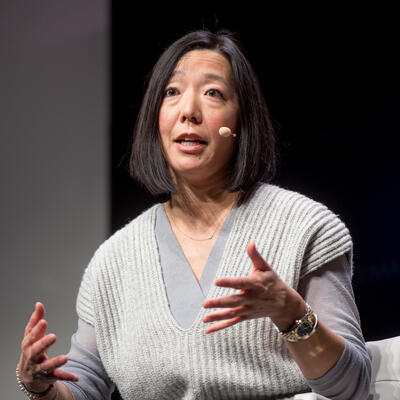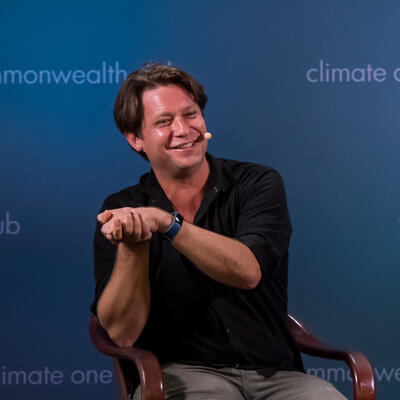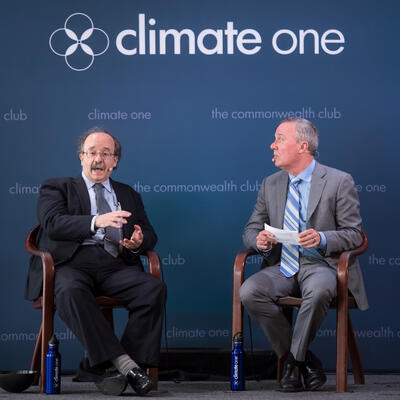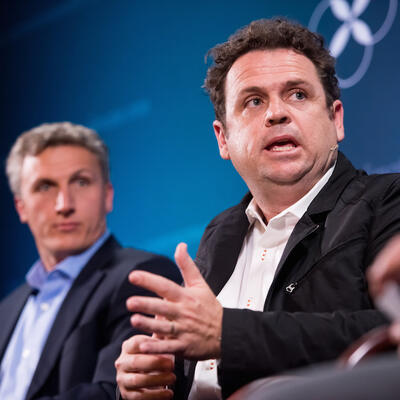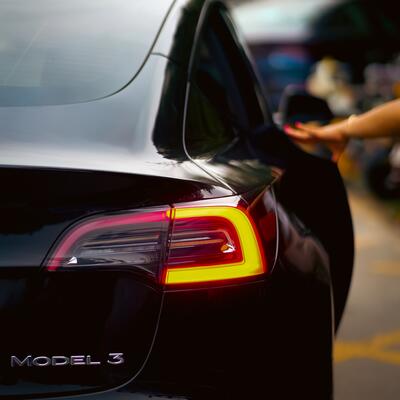
He Started Tesla Employees Against Elon. Then Got Fired.
Guests
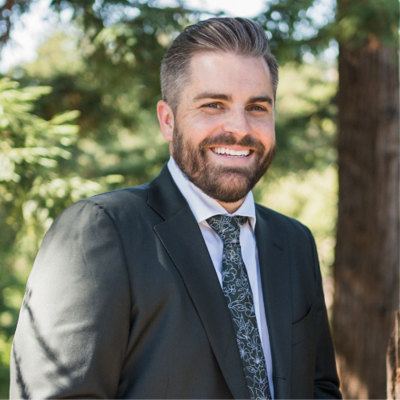
Matthew LaBrot
Summary
Matt LaBrot was the Tesla sales manager who got so fed up with how Elon Musk’s public persona affected the brand that he published a website called “Tesla Employees Against Elon.” He was subsequently fired, allegedly for "using company resources to build a website that did not align with the company’s perspective."
For our pod audience, we’re dropping this extended version of Greg Dalton’s conversation with Matt LaBrot. A portion of this interview aired in our episode “Is The EV Transition Stuck in Neutral?” on June 27th.
Resources From This Episode (1)
Full Transcript
Note: Transcripts are generated using a combination of automated software and human transcribers and may contain errors. Please check the actual audio before quoting it.
Greg Dalton: Why did you initially wanna work for Tesla?
Matt LaBrot: I spent a few years living in Seattle working at Starbucks, and that was early Tesla days, so I saw a few Roadsters rolling around at that time. It was really cool to see those and then to find out that they were electric, and then to learn more things about what Tesla was doing and the mission that they were focused on. All of that was really. Not just cool to me, but important to me as a relatively younger person. At that point, I was looking at Tesla as a company that could make electric vehicles cool, could help sustainability long term and see where that could go. And trying to find an in to where I could work for that super cool company without being an engineer was something that I worked hard on and, and found my way in. And the rest was history.
Greg Dalton: Right, and you worked there for over five years. What was your job like? What did you do? Yeah,
Matt LaBrot: So I started in Southern California as an assistant sales manager, so that's where I brought my retail experience from Best Buy and Starbucks, and even real estate before to this. Fresh up and coming, vehicle company. Uh, so I started in sales in the field and moved from Southern California to the Bay Area, where I eventually left the field and became a sales and delivery program manager focused on training. So my most recent role was to create sales and delivery training content for North America, about 2,500 employees.
Greg Dalton: And what did you think of Elon Musk, uh, when you started working there?
Matt LaBrot: Yeah. I thought about him as this very cool figurehead that was accelerating the world's transition to sustainable energy. And he was a person who was able to, it's hard to say, make it cool because of course him being on stage has never screamed. Cool. Um, but it was. Cool enough, and the product was so cool that it was able to get people interested in EVs in a way that they hadn't been before. And that made him cool. That made him cool to me, that made him cool to other people my age and the rest of the people that I was working with, they saw him as the work that he was doing was cool, and it was leading in a direction that we all believed in.
Greg Dalton: There's no doubt the auto industry would not be where it is regarding EVs if it weren't for him, Detroit and, uh, Tokyo would've never embraced EVs. he was a disruptor. when did your opinion of him start to change?
Matt LaBrot: Yeah, my opinion changed a couple of different times. First, it changed when I was just a regular frontline employee that had to deal with my CEO tweeting things that weren't real, and I had to be the one that would break it to the customer that, oh yeah, no, sorry, full self-driving isn't actually out yet and know our car can't do that or that or that. So it it sullied pretty quickly there. Uh, but you know, you could still look at him as well. He's still driving sales and all of that. But then it really started to change with the Twitter acquisition, and then very heavily during the Trump's second presidency, where we started to see him supporting a candidate that a lot of us knew, didn't believe in the same foundational things that most Tesla employees did. And even just saying, you know, accelerating the world's transition to sustainable energy. We all knew that. That candidate didn't support that mission, and that was really difficult for us. And then I saw that very quickly affecting our customers and our total sales. And as a career sales person and person who believes in this mission, that was really difficult to see a negative impact on the company because of that.
Greg Dalton: Right, but Tesla has been controversial from the beginning. You know, that's what a disruptor came in and it was, uh, not playing by the same rules. I mean, there were concerns about worker safety, busting unions, racial relations on the factory floor investigations, et cetera. Did any of that register with you or with the customers?
Matt LaBrot: Yeah, it, it definitely registered with us and with customers as well. For, for me specifically, I would see anything around safety. There's enough internal information being passed around of these are things that we're working on. And continuous improvement is another thing that Tesla would always preach. And there's internal lines to reach out to for safety improvements and things like that. But as far as the customers go, as we were, we'll say, scaring away customers for these reasons, you know, whether people saw any cases that were happening against Tesla, as some people started to shy away from purchasing a Tesla, those people were far outpaced by brand new EV adopters. So even if we were losing people left and right, the amount of people coming in. still made sales numbers continue to grow and our business continue to grow and not seem like that big of a deal to be losing some of those customers. I.
Greg Dalton: Right. The model Y comes on, it's affordable. I think at one point it's close to like the world's best selling car. I see it everywhere. I see it in China. It's all over the place. Uh, so. The growth is so strong that, that, you know, those undercurrents don't hurt it. Is there, you mentioned the Twitter acquisition, which is when some people think that he started to get high on his own supply and kind of, you know, really start to drift. But was there a recent real inflection point where he really became toxic to the brand?
Matt LaBrot: I mean, yeah, so the Twitter acquisition, high on your own supply is a hilarious way of saying it. , There's also just this echo chamber, right, of people continuing to agree with you. but where he soured. Most customers was through the political decisions that he started making, you know, we'll call it second half of 2024. That was when it became very difficult for customers who just believe in the mission to think that purchasing a Tesla is a good idea when they're supporting somebody who's taking the money that he's making from these sales and is putting them into something they don't believe in.
Greg Dalton: Right. And you eventually created a website called Tesla Employees against Elon. That's a pretty strong action to take against the CEO of the company you're working for. What drove you to take that action and take us to that moment where you're like, okay, I'm gonna do this. I'm gonna publish this site.
Matt LaBrot: Yeah. What drove me to do it is that Tesla didn't, there were so many opportunities for Tesla to even separate themselves from Elon in the aspect of saying, Hey, our CEO is doing this with his own private funds, but Tesla is still focused on this mission. You know, there were so many opportunities for them to say that and they didn't. When the salute happened or the alleged awkward gesture, whatever you want to call it happened. That to me was a huge turning point because I, I kind of was able to, to let a little bit of air out and I thought, oh great, like Tesla's gonna be able to, they're, they're finally gonna do something here because your CEO can't go on stage and do that. And then not only did they not take a, a negative action, they, on their personal Twitter account said, you know, they, they put him up there as, this is still our guy, this is still the person that we support. And then they had a town hall meeting or an all hands call as we would call them. And not only , was he the only person who presented on that all hands call? That all hands call was live streamed to everybody. And that was Tesla really saying, this is our guy, he's gonna continue to be our guy. We don't care what he does. And once that happened, that's when this starts to fester in me a little bit more of they're not gonna do anything. And the repercussions to this are gonna continue to negatively impact our business and our jobs. You know, Tesla employs a ton of people in California, a ton of people across North America building and growing a factory in Texas. You know, as sales start to decline, this will have negative impacts on jobs. So that is probably the biggest catalyst of me deciding, okay, I need to do something. And that's where the website came from.
Greg Dalton: And at that moment when you're publishing it, what did you expect to happen and how does that compare to what did happen?
Matt LaBrot: Yeah. Um, you know, I didn't really know what I was expecting. I knew that this message needed to get out there. I was really hoping that it would be picked up by media and just be shared more and keep pushing this conversation that we're not all happy with the course that we're taking. And what ended up happening is a few days after I posted. Well, a few days after I posted, I got fired. But also aside from that, a few days after I posted the Wall Street Journal wrote an article that said, the board is looking for a new CEO and somebody sent me that. And I was like, okay. I, first of all, I didn't think that I did that. I just, uh, you know, thought that this was a confirmation that things were heading in the right direction. And within 30 minutes of getting that article sent to me, official Tesla account says, Nope, that's not true. Elon, of course says that's not true. Uh, and then the many decisions they've made since then continued to prove that, that that's not true. And so with my mission and having written the letter and trying to get this, this information out there, I wanted to tell other employees that they're not alone in feeling this way. You get that feeling when you know you're messaging people on the side after these meetings that you have where they're trying to talk about driving sales, but don't call out the elephant in the room. You know, you'll message a few people on the side and you'll make jokes about how crazy it is, but you kind of still feel like you're in a silo. Getting this message out there and having articles written about it. And you know, I had a LinkedIn post that got some traction as well. Enough people have reached out to me. Even people that I was shocked to hear from, people that I didn't think agreed with me, a lot of them reached out and said, you know, I don't know what to do and I don't know if I'm supposed to leave and, you know, make a better decision on the outside or if I should keep fighting from the inside. So people are still really torn, but we've all, it's already been proven that Tesla is not going to change here. So those employees, the ones that are still there, I support them in, in still being there. It's such a tough job market. You don't wanna be unemployed right now. So I hope that they're just doing the best they can while they're there and hopefully the company will maybe eventually make a decision.
Greg Dalton: Right, and there's been some real, dramatic brand destruction here because of Musk's foray into politics. In 2021, the Harris Axios poll on brands had Tesla ranked as number eight. It's currently number 95. That is a dramatic drop for a company self-inflicted, really. Um. Does that sit with what you're seeing in terms of that, you know, that tremendous brand damage?
Matt LaBrot: Yeah. So with that, I think it's, it's so important to call out that Teslas have only continued to get better since 2021. Build quality has gotten better, safety has gotten even better, range. Uh, though not a huge number change, but efficiency has been improving, uh, year over year. All those things have continued to get better. Service has gotten better. Delivery experiences, like all of these things would lead to, you should be scoring higher. And then when you see, okay, now they've dropped down to, you know, 90th something that, that you mentioned, that is only because of people's perception of Elon's public persona. That is the only thing dragging that score down, and it shows that the company is really, really in trouble.
Greg Dalton: Right, So. I'd like you to read the opening of the letter on your website.
Matt LaBrot: Sure. Yeah. So it starts with, let's be clear, we are not the problem. Our products are not the problem. Our engineering service and delivery teams are not the problem. The problem is demand. The problem is Elon.
Greg Dalton: So how does it feel to you to, to, to read those words that you wrote and, and change your life?
Matt LaBrot: Yeah, I still stand behind it. I, you know, I've had a few different people still reach out and say, well, I had a terrible service experience, or, you know, well, the cyber truck sucks, or things like that. And, and I'll take that fair, fair piece, but the biggest point there is the problem is demand. The problem is, Elon, there is no reduction in EV demand. EV demand continues to grow, including in Q1. EV demand continued to grow. So when you see a reduction in Tesla sales, it's not because people are souring on EVs, it's because they are souring on Elon and that's a huge problem for a company. That's main product is EVs.
Greg Dalton: Right. But some people, I guess from where I sit, if think, think caring about climate change, as people are switching to other brands, there's a lot more choices. There's dozens and dozens of EVs out there, right? Used to be Tesla, you know, pretty much owned the market. How much do you think Musk has personally hurting the transition to EVs overall?
Matt LaBrot: Yeah, I, I think he is. I think it's making a rippling effect. There are other options that people could go with. Honestly, my mother-in-law was worried about tariffs and she needed to purchase a new vehicle, or she felt she needed to purchase a new vehicle in Q1, and she bought an ionic 5. And it's a totally acceptable vehicle. It's got too many buttons for me, but it's an acceptable ev and she's happy with it, and I'm happy for her to have that, where it's gonna be hurting. The EV change as a whole is the repercussions that we're dealing with with this big, beautiful bill uh, is certain incentives going away or even just not even incentives if you take away the cash incentives for it, when you're looking at state requirements for emission standards, if those start to get rolled back and changed, that is what will hurt ev ab adoption because people need to be incentivized to try their first EV to see how they can get it to fit into their life. And once they start to realize, oh, this is not only easy to fit into my life, a lot of times it's better and it's a cleaner vehicle with less emissions. That's a no brainer for a lot of people. So. As we lose, potentially lose some of these incentives, to continue to drive electric vehicle adoption, we make the barrier of entry higher for people to start adopting this as a new vehicle and that, and that's going to affect overall climate change.
Greg Dalton: Right. And climate has never really been front and center for, for Tesla. Okay. Yeah. They had zero emissions tag on the new license plates, but it really sold on cool and sexy, not virtue. Right? This wasn't sort of, uh, an eco, do-gooder brand. Uh, what's your sense of Tesla's commitment to, to the climate crisis? Because that's certainly, at odds with where Musk has been politically and certainly the administration.
Matt LaBrot: And that's where you can say Tesla, this whole time has been committed to clean energy. And yes, I agree. They've kind of downplayed that in adoption of let's get people to buy these things 'cause of their cool, not because it's the right thing to do, but even to this day, I believe that the majority of people that are going to work every day at Tesla are still wanting to push clean energy and climate change for all of the beneficial reasons, and that is where you have to look at Tesla's board and Tesla's upper leadership and acknowledge that they have done a disservice to the company by not making a change in leadership or by trying to separate themselves from Elon's personal brand, and he's struggling with that now too. And Tesla never stopped supporting climate, but their figurehead stopped supporting it. And even if he's trying to pull it back right now, unfortunately it's, it's too late for him to still stay the CEO of Tesla and for Tesla to succeed.
Greg Dalton: Hmm. So let's talk about you personally. You said quote, I was very happy in my position. I could have continued to work in that role my whole life. End quote, but you were fired for speaking your conscience. Uh, and Tesla says you were using company resources to build a website that did not align with the company's perspective. So what's been your life since you got fired?
Matt LaBrot: Well, let's go from when I hit publish. I hit publish and I instantly felt this weight that had been lifted, and I, I felt more happy than I had in a while as far as what the decisions I had been making. And yes, I never wanted to leave my job. I still think about it on a daily basis of what I should be doing to help accelerate the world's transition to sustainable energy that is built into me now. so now I'm looking for a job that will continue to allow me to do that. I am volunteering as much as possible, taking extra care of the kids. They're on summer break now. but the whole mission is still to get back into a role that I can help accelerate the transition to sustainable energy in any different way.
Greg Dalton: So if you could do it all over, would you do it again?
Matt LaBrot: Yes. There's a, there's a sense of is it worth it? Um, as of right now where I'm sitting unemployed and he is still the CEO of the company, it, it doesn't seem super worth it. I think, Q2 numbers will further prove the decline in Tesla sales and further validate the letter that I wrote. And I think as we go further on, it will become more and more clear that what I did was the right thing to do and I will even stand behind it more as, and feel better about it as time and time goes by.
Greg Dalton: Well, Matt, thank you so much for sharing your story with us on Climate One. I really appreciate it.
Matt LaBrot: Thank you.
